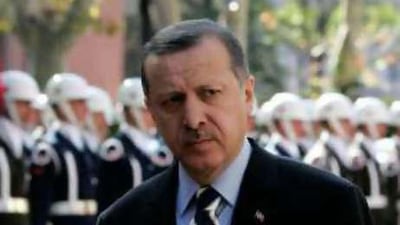ISTANBUL // The European Union has called for more political reforms in the candidate country Turkey, but despite signs that patience with the Turks is wearing thin in Brussels, European as well as Turkish observers wonder if Ankara is in the mood to listen to the EU.
"Looking back at the developments in Turkey in the last year, I wonder whether the Turkish government is still willing to continue with the reform process," Ria Oomen-Ruijten, the European Parliament's rapporteur on Turkey, said in a statement after the EU Commission released a major report on the state of affairs in Ankara this week. "Impatience in the European Parliament is growing. We need a clear signal from Turkey that it wishes to continue with the integration process to which it committed itself in 2005" when membership negotiations started, said Ms Oomen-Ruijten, a Dutch member of the European Parliament.
In its so-called progress report, the EU Commission criticised the government of Recep Tayyip Erdogan, the prime minister, for stalling on the reform front even after it received the backing of almost 47 per cent of voters in last year's general election. "Despite its strong political mandate, the government did not put forward a consistent and comprehensive programme of political reforms," the EU said. An increase of reported cases of torture and ill-treatment is a "matter of concern", the report added.
"Progress on reforms was limited," the EU said in a statement coinciding with the publication of the report. The Erdogan government has spent much of its time since last year's election trying to push through an end to the ban on the Islamic headscarf at universities and fighting a court case that sought to shut down Mr Erdogan's ruling party. But that should not be an excuse for slowing down the reform process, the EU said.
"Now that Turkey has averted a political crisis linked to the Constitutional Court case against the governing party, it needs to reinvigorate the process of political reform," the statement said. "The lack of dialogue and a spirit of compromise between the main political parties had a negative impact on the functioning of the political institutions and on political reforms." Touching upon another sensitive subject, the European Union said in its report that Turkey's military continued to meddle in politics although European rules call for generals to keep out of non-military affairs.
"The armed forces have continued to exercise significant political influence via formal and informal mechanisms," the report said. "Senior members of the armed forces have expressed their opinion on domestic and foreign policy issues going beyond their remit, including on Cyprus, the south-east, secularism, political parties and other non-military developments." The European Commission, the executive body of the EU's 27 member nations, issues progress reports for all candidate countries in the autumn of every year, listing successes and failings on the way to membership, which is tied to political and economic criteria.
As a candidate wanting to join the EU, Turkey is required to take over tens of thousands of pages of EU legislation into its own laws and implement European rules that cover everything from hygienic standards in food production to the right of a citizen to criticise the government. Ankara has not made much progress since membership talks started in 2005. Despite three years of negotiations, Turkey has been able to open talks in only eight out of 33 chapters that have to be worked through.
Echoing Ms Oomen-Ruijten's pessimistic assessment, some analysts in Turkey think Brussels can do little to speed things up because the government in Ankara has come to the conclusion that the country is doing fine. "The European Commission has lost all leverage on Turkey," said Cengiz Aktar, a political scientist at Istanbul's Bahcesehir University. As Brussels glossed over a lack of reforms instead of putting pressure on Turkey in recent years, Ankara had felt free to pursue other issues, he said. There have been some promises of reform, such as a new television channel for the Kurdish minority, but few concrete actions.
Mr Erdogan's government denies it has put political reforms on the back burner, but even Abdullah Gul, the president, a former member of Mr Erdogan's governing party and a personal friend of the prime minister, has publicly demanded that political reforms be stepped up. The lack of any serious reform push by Ankara since 2005 has led officials and observers at the EU headquarters in Brussels to think that the Turkish government was never serious about membership in the first place, a commentary in the pro-government newspaper Zaman said. "The number of those who think that Erdogan never believed in the EU process, that he never internalised it and that he sees it merely as a means to an end is growing."
Mr Aktar agreed. "The Erdogan government is not interested in the EU matter at all," he said. "They don't understand the importance of the EU for Turkey. They think that Turkey doesn't need the EU." But if Mr Erdogan's government is accused of dragging its feet by some, others think it is doing too much already to fulfil the EU's every demand. Oktay Eksi, a top columnist of the Hurriyet newspaper, criticised the EU's call for more rights for Turkey's estimated 12 million Kurds.
"What is the aim of the EU in creating new minorities in Turkey?" Eksi said. He said the 1923 Treaty of Lausanne, which became the international birth certificate of modern Turkey, said that only Greeks, Armenians and Jews were minorities in Turkey and accused the EU of inciting separatist feelings among different ethnic and religious groups. "Nobody asks them, 'Is that really your business?'" Eksi wrote.
Turkey would have to obey the EU's rules to become a member, he admitted. "But there is no reason to be so stupid or so weak to say yes if EU authorities get up and want us to accept 'club rules' that reflect their own whims." tseibert@thenational.ae

